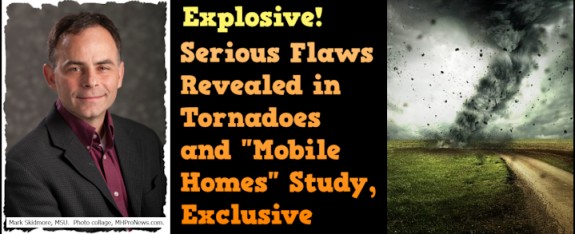
– Mark Twain
“How many legs does a dog have if you call his tail a leg? Four. Saying that a tail is a leg doesn’t make it a leg.”
– Abraham Lincoln
“We don’t plan to respond any further…Our analysis captures the average effect of mobile home living on tornado related fatalities…it does not distinguish between types or nature of mobile homes such age, improper installation of additions, proper tie downs, etc.”
– Mark Skidmore, Michigan State University (MSU)
In an explosive set of admissions that were not part of their original, and widely-published by other media study of tornadoes, deaths and ‘mobile homes,’ MSU’s Mark Skidmore admitted in an on-the-record email exchange with MHProNews that several factors were ignored in their research.

“Those factors,” says L. A. “Tony” Kovach, “completely change the import of their findings. When they admit that they didn’t consider the age of the homes, improper installations, proper tie downs and other factors, that’s like admitting that some of the key facts in the cause of death by tornado are being ignored.”
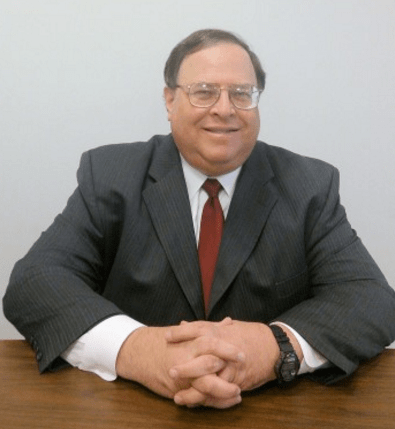
“It’s unfortunate and telling that the authors, when confronted with the facts regarding today’s manufactured homes were unwilling to further engage and address those facts,” said Mark Weiss, JD, President and CEO of the Manufactured Housing Association for Regulatory Reform (MHARR).
Weiss was a party to the exclusive exchange from the outset.
“I am happy to talk with you or correspond with further if that is helpful,” said Skidmore just last week.
That willingness to was before he had to look, and look again, at facts that they now admit to not considering.
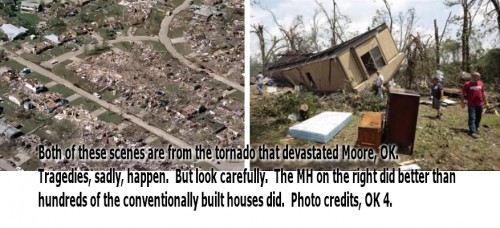

Skidmore said, “…Again, I think the benefits of manufactured homes are great…I see them as filling an important niche in the housing market (as highlighted in the book chapter I forwarded). Still, is it possible we could do better? A high proportion of tornado fatalities are connected to mobile home living, and it isn’t just our research. Does it make sense to look at this more carefully and see if we can do better? Maybe it’s just the older mobile homes. Or maybe its improper tie downs. Or maybe is the improper additions you highlighted. Certainly there is variability in quality of manufactured housing…I’d be quite happy to live in some but others are shoddy. Perhaps additional analysis could help zero in on what is happening??”
He added, “Manufactured housing has come a long way while at the same time maintaining affordability…but isn’t there room for further improvement?”
Kovach did not disagree with the MSU findings, rather, he pointed out that the findings failed to dig into issues that impacted the topic of fatalities, which was sensationalized in the media and their publicity of the research.
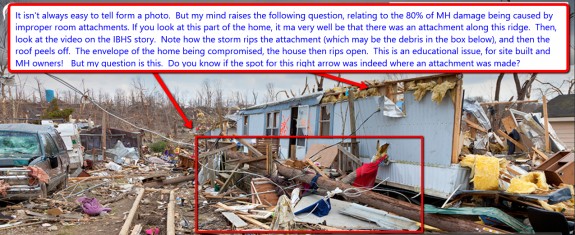
Kovach also noted that conflating the terms ‘mobile homes’ and ‘manufactured homes’ creates potential confusion for those residents who are living in manufactured homes. HUD Code manufactured home owners and residents could be made to think that they had the same risk factor that mobile home residents do. That’s not a given, as Skidmore was happy to admit.
“I did not mean to conflate…I think the statement indicates that they are different…I just don’t have data to test for differences and I asked you if you have such data,” Skidmore replied.
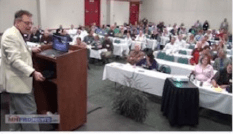
“Mark,
I hear you sir, and I get that point. But the research is being pushed out by Forbes and others with conflated terminology.
Your problem noted is correct, the Census Bureau doesn’t break it down. But I’m not sure you see that this doesn’t excuse the other issues?
So that still leaves our other questions unanswered. Kindly do so, point for point. Just reply below to each question, for clarity. It’s necessary for the record to be clear to all involved.
Again, thank you,” replied Kovach for MHProNews.

After a few days elapsed without a reply from MSU, Kovach and Weiss followed up.
“Hi Tony, We don’t plan to respond any further. However, please let me know if you are aware of any additional data on the nature of mobile homes by county over the last 40 years; we are interested in doing additional statistical analysis to learn more about what it is that makes some types of mobile homes more vulnerable to high wind events such as tornados. Our analysis captures the average effect of mobile home living on tornado related fatalities…it does not distinguish between types or nature of mobile homes such age, improper installation of additions, proper tie downs, etc. Best regards, Mark,” said Skidmore.

Kovach pressed for additional responses to substantive questions. Those are planned as part of yet another critical revelation coming on yet the apparent flaw in such research.
When Kovach’s follow up drew no response, MHARR’s Mark Weiss jumped in.

“Mark, you stated last week that you would be happy to engage in such a discussion. Having set this episode in motion with hyperbolic language and some dubious assertions, I would ask that you please do respond to the questions posed by Tony Kovach, thank you,” wrote Weiss for MHARR.
Silence — from Skidmore, his research colleague, and the communications department at MSU followed.
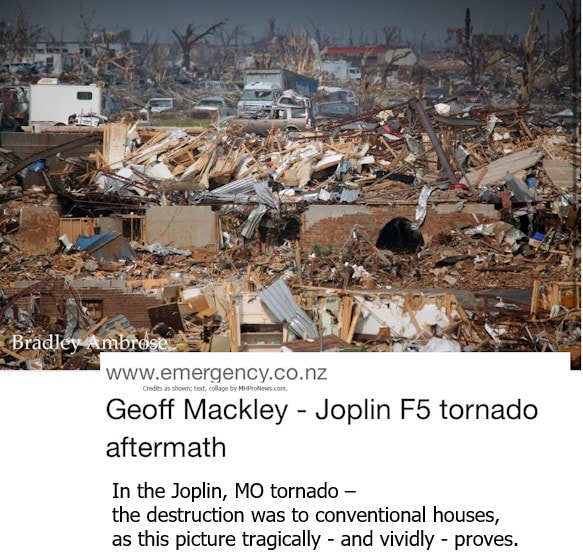

“In 2016, NOAA Reported 12 deaths in what it calls “mobile homes.” That’s a 0.00000055% chance of dying in a tornado for the year. To rephrase, the odds were 1,833,333 to 1 in your favor that you wouldn’t die in a mobile or manufactured home in 2016,” said Kovach.
“Imagine if you could go to Las Vegas and get 1.833 million to one odds in your favor. Vegas would go broke in a day. That’s one of the safest bets imaginable,” he says.
“Should there be tornado safety promotion? Yes, but that should not be limited to mobile or manufactured homes. Are there safeguards that professionals and consumers should promote and practice? Yes. But as things stand at this very moment, you’re at greater risk of dying in your bathtub by a factor of 70 than you are in dying in a mobile or manufactured home. Tens of millions are under the false impression that manufactured homes are death traps. That’s simply not the case, nor is it true of older mobile homes.”
No one is suggesting doing away with or avoiding using bathtubs due to accidental deaths that take place in them.
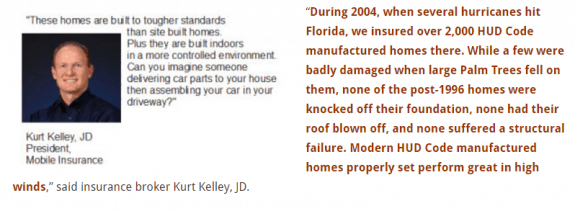
Key Facts Skidmore’s Statements Spotlight.
MHProNews and/or MHLivingNews will do a follow up in the near term, but in the interim, the revelations above undermine the MSU study – and all others like it – for the following reasons.
1) Mobile homes and manufactured homes are not the same thing.
2) When Skidmore admits that they are different, yet the terminology is conflated – it’s akin to calling a bag phone from the 1980s a smart phone today. The smart phone evolved from the bag phone, but they are quite different in capabilities.
3) None of the publicized material by MSU made it into the admissions that Skidmore did in the on-the-record Q&A with Kovach and Weiss. For example, quotes from Skidmore:
- “I think the benefits of manufactured homes are great.”
- “I see them as filling an important niche in the housing market.”
- “Maybe it’s just the older mobile homes.”
- “Or maybe its improper tie downs.”
- “Or maybe is the improper additions you highlighted.”
- “Certainly there is variability in quality of manufactured housing…I’d be quite happy to live in some but others are shoddy.”
- “Perhaps additional analysis could help zero in on what is happening?? “
It is precisely that “additional analysis” that the Q&A with MSU, MHARR and MHProNews was aimed at accomplishing.
Will other media, once they discover these admission, begin to dig deeper?
“We will continue to follow this topic,” Kovach said, “and we encourage industry professionals to share these facts with their residents. Improper add-ons and proper tie downs are two of the keys, per the research by IBHS Chief Engineer Tim Reinhold.”
Kovach did want to publicly thank Skidmore and Weiss for taking part in the frank and respectful exchange. Kovach noted that Skidmore may have been under instructions from MSU not to go further in the dialogue. As other third party research has shown, universities often receive grants that can influence their research, and the outcomes of that research.
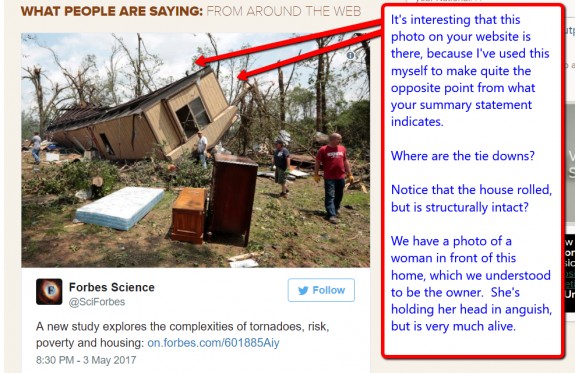
To see the full text of Skidmore’s originally published article, along with the his full study, plus the early parts of the email exchange – including comments from other manufactured home industry professionals – in those details, click here.
For additional resources relating to the climate portion of the issue MSU raised, see this linked page. The information linked from this report and the insights above are already useful in countering the false impressions similar research produces. “This is important for professionals, the public, public officials, policy wonks, the media, and open-minded researchers,” Tony Kovach said. ##
(Editor’s note: A veteran reporter told MHProNews that a good story – or a good study – ought to be “bullet proof.” No flaws should exist in the narrative, argument or findings. The quotes at the top of this article aren’t meant to imply that Skidmore or his colleagues at MSU have deliberately deceived using statistics or by mixing nomenclature. But they raise the point that even if the MSU statistics are precise, they fail to address the issues noted above. That flaw makes their research almost irrelevant in terms of its value. Further, by conflating terminology, it creates risks that would not otherwise exist, which will be part of our follow up report. Watch for it.)
(Image credits are as shown, and when by third parties, are proided under fair use guidelines.)

